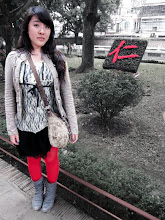I don't feel much of anything yet, except a nascent headache at the prospect of clearing out this little room before Wednesday. A drawer full of crumpled papers. Tea leaves and long hairs to sweep off the floor. I'm so disgusting my messiness ought to be thematized as an emblem of original sin. And I've bought too many books, mostly translated from various western languages into traditional Chinese-- everything from the Symposium to Twilight. Hey, I'm not ashamed-- doing readings in a foreign language is like instant rigor, just add water.
Anyway, here's the end-of-term speech I promised. It's a little harder to translate this time, just because my repertoire of expressive structures specific to the Chinese language has increased-- meaning ICLP has achieved its purpose really nicely, I guess.
American poetry idol T.S. Eliot once described in his magnum opus, The Waste Land, the mysterious dialogue that unfurls between man and nature: "Then spoke the thunder/ DA". Eliot is, in all of modern literary history, the single figure best suited to playing the role of modernist prophet-- the reason being that his poetic corpus subjects the zeitgeist of modernity to a meticulous and thorough investigation. Consequently, under the shadowy shroud of modernization, the reader can use his works to understand the philosophical issues faced by the contemporary world. To use the aforementioned conceit as an example, the questions of philosophy touched up by that one line include the epistemological position of science in modern society.
The moderns often access nature through science, utilizing its rationalistic gaze to uncover the mysteries hidden by the material world and to answer the questions put forth by the universe. Every time we hear the mysterious sound of thunder, we unconsciously start to imagine what manner of theses it means to express, what manner of secrets it means to conceal. We want to revise that meaningless drumming into familiar language-- to make the thunder speak. This sort of approach to is sufficient to represent the scientific Weltanschauung, revealing the means through which it transforms natural phenomena into a logical language accessible to human kind, a process like unto translation.
At present, mainland Chinese philosophers have already come to look upon science as a topic of study that can't be overlooked, because the modern man's episteme often centers on the scientific method; it is as if he uses laboratory manuals as blueprints for thought and life. At the same time, over the course of intensifying their study of western thought, contemporary China's philosophical community has come to realize the importance of science to philosophical investigation. In sort, the psyche of the moderns, regardless of whether they are latter-day philosopher-kings or ordinary people, often manifests a tendency towards the worship of science.
According to the research of New Modern Confucianist pioneer Xiong Shili, the position of epistemological supremacy currently occupied by science is not undeserved, but science remains unequivocally limited in its scope because, when it comes to the cultivation of virtue, it is without utility. Furthermore, if we consider things from the angle of the Confucian fundamentals, then the excessive worship of science will cause one to reap the ill fruits of materialism, at the same time damaging both man's original oneness with nature and the Confucianist's respect for the Way, thereupon leading to the great tragedy of modernity. Consequently, when Xiong Shili attempted to root out the cause of Confucianism's decline, he found that it was due to none other than the flourishing of western science in Chinese thought.
If we are to thoroughly and effectively resolve the moral issues Xiong Shili pointed out, we can consider things from the perspective of the Confucian tenets, at the same time relying upon the reviving the Way of benevolence and virtue to reform society. That being said, we need not, in order to realize the dream of cultivating the sprouts of Confucian thought, chop down the pine tree of western science. These two ways of knowing need not make war against one another within the halls of academe; rather, they are equally meritorious epistemes that, properly speaking, ought to complement one another.
According to the research of New Modern Confucianist pioneer Xiong Shili, the position of epistemological supremacy currently occupied by science is not undeserved, but science remains unequivocally limited in its scope because, when it comes to the cultivation of virtue, it is without utility. Furthermore, if we consider things from the angle of the Confucian fundamentals, then the excessive worship of science will cause one to reap the ill fruits of materialism, at the same time damaging both man's original oneness with nature and the Confucianist's respect for the Way, thereupon leading to the great tragedy of modernity. Consequently, when Xiong Shili attempted to root out the cause of Confucianism's decline, he found that it was due to none other than the flourishing of western science in Chinese thought.
If we are to thoroughly and effectively resolve the moral issues Xiong Shili pointed out, we can consider things from the perspective of the Confucian tenets, at the same time relying upon the reviving the Way of benevolence and virtue to reform society. That being said, we need not, in order to realize the dream of cultivating the sprouts of Confucian thought, chop down the pine tree of western science. These two ways of knowing need not make war against one another within the halls of academe; rather, they are equally meritorious epistemes that, properly speaking, ought to complement one another.




No comments:
Post a Comment